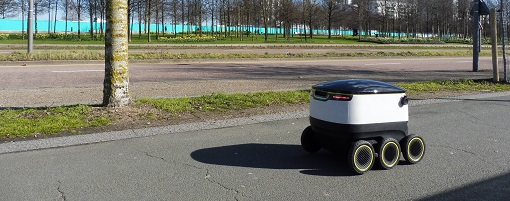Starship Technologies, the developer of autonomous delivery robots, has raised $100 million in the past month.
The San Francisco-headquartered company revealed it has now reached three million commercial autonomous deliveries - with the number of deliveries growing by over 60,000 per week.
According to the business, overall deliveries tripled last year.
The robot delivery market is expected to reach $55 billion by 2026, according to figures from Fact & Factors.
The company, which has a food delivery app where users can track the journey of its delivery robots via an interactive map, said that $42 million of the investment was sourced from a Series B funding round led by NordicNinja and Taavet+Sten.
Starling said the $100m investment - which includes a recently announced $57 million investment from the European Investment Bank - doubles the company's funding and bringing total funding to $202 million.
It says the money will be spent on scaling its service and launching in new cities in North America and Europe. This will include university campuses in the US.
“The autonomous delivery market has been gaining momentum the past couple of years and we think it will really take off this year,” said Alastair Westgarth, chief executive of Starship Technologies. “The demand for Starship’s services continues to rapidly increase and we are regularly contacted by more college campuses and cities that want our services, often because they hear about the great results that Starship is already delivering.
"I’m impressed with every member of our team who believes in what we are doing and has helped us hit yet another milestone of three million commercial deliveries. I also appreciate the investors who trust our vision and who are helping us get to the next phase of our journey."
Latest News
-
£33m BrewDog sale to Tilray triggers 484 job losses
-
Wickes launches retail media network
-
Ikea China launches self-driving electric vehicles following successful pilot
-
Modella plans restructuring of TG Jones estate
-
Pepco Group launches app in Poland
-
Topshop holds ‘world’s first’ AI-driven shoppable fashion show
Beyond Channels: Redefining retail with Unified Commerce
This Retail Systems fireside chat with Nikki Baird, Vice President, Strategy & Product at Aptos will explore how unified commerce strategies enable retailers to tear down these barriers and unlock new levels of operational agility and customer satisfaction.
The future of self-checkout: Building a system that works for consumers and retailers
In this webinar, industry leaders discussed what the future of self-checkout looks like and how retailers can make the technology work for everyone.
© 2024 Perspective Publishing Privacy & Cookies











Recent Stories